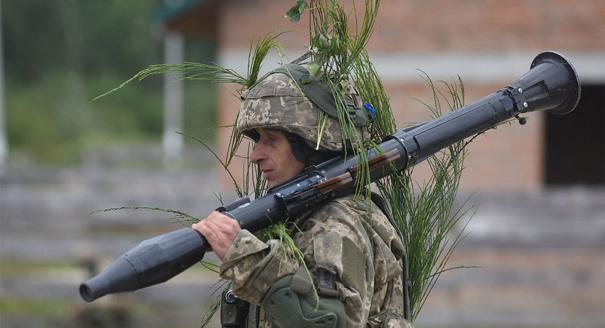Russia’s military buildup along the Ukrainian border is generating alarm in Washington, DC and other Western capitals. Fears that this time, the Kremlin’s actions will culminate in another war have prompted a hastily arranged video call on Ukraine between U.S. President Joe Biden and Russian President Vladimir Putin, due to take place on December 7.
So far, all of the Western anxiety and hand-wringing about the crisis seems to be clouding people’s ability to listen to what the Kremlin is actually saying. Until now, there has been surprisingly little Western acknowledgement that Russian President Vladimir Putin is being much blunter about what he wants in Ukraine and the lengths to which he is prepared to go to obtain it. In just a few days, Putin has said that he wants a deal to prevent Ukraine from ever joining NATO. He also wants a Western promise never to deploy NATO military infrastructure in Ukraine. Putin cited U.S. MK-41 missile launchers now in Romania to illustrate what he’s worried about: “I will repeat once again that the issue concerns the possible deployment in the territory of Ukraine of strike systems with the flight time of 7–10 minutes to Moscow, or 5 minutes in the case of hypersonic systems. Just imagine that.”
Why is Putin, who sometimes keeps his cards close to the vest, being so specific? Seen from Moscow, it appears that the Kremlin’s key objective in the current crisis is not to inflict a humiliating defeat on Kyiv or to take on the unsavory job of occupying Ukraine. Rather it is aimed at persuading the West that Russia is prepared to start a full-scale war over Ukraine unless something is done about the existing and (in Putin’s eyes, at least) completely unacceptable state of affairs.
Over the past year, the Kremlin has communicated two simple messages to Biden and his team. First, Russia attaches paramount importance to Ukraine. Second, its patience with the status quo is running thin, and it is ready to take drastic measures to reverse the situation.
These messages come in a variety of forms, including harsh public statements, lengthy essays penned by members of the Russian leadership such as Putin himself, and even the publication of confidential correspondence between Moscow and France and Germany on the Donbas conflict. The last step was unprecedented and apparently intended to communicate Russia’s utmost irritation with the stalemate in the implementation of the Minsk agreements aimed at ending the conflict.
Moscow’s main concern—preventing Ukraine from joining NATO—is hardly new news. What has changed is that the Kremlin now argues that even if Ukraine never formally accedes to the alliance, it must never be turned into a U.S. military bridgehead on Russia’s border.
Other issues are also being identified as must-haves by the Kremlin. It wants to prevent the European Union from linking flows of Russian natural gas to Europe to the Ukrainian conflict. This issue has become more acute in recent months due to the debate over the controversial Nord Stream 2 pipeline, which was designed to end once and for all the need for export infrastructure passing through Ukrainian territory.
Cultural issues are particularly neuralgic. In his extensive article on Russia-Ukraine relations, Putin emphasized the historical affinity and unity of the two nations while harshly accusing the Ukrainian authorities of using coercive assimilation policies to diminish the number of Russians living in Ukraine “by millions.” The use of such strong wording was no coincidence: mass coercive assimilation may constitute a misdeed grave enough to warrant a foreign intervention to stop it.
Ever convinced that a kind word and a gun are more efficient than a kind word alone, Russia has accompanied all of these forms of communication with military ones, transforming the security balance on the ground. By moving huge numbers of troops to the Ukrainian border, the Kremlin now has the ability to threaten the country from the south and north, as well as the east.
Putin wants Biden to finally face up to an unpleasant dilemma. The message is simple: Washington needs to brace itself for its partner Ukraine to be soundly defeated militarily in what would be an especially humiliating re-run of recent events in Afghanistan. Or it can back down and reach a compromise with Moscow over Ukraine. The Kremlin seems to be under no illusions that the first option would inflict huge costs on Russia’s economy and international standing. But it wants to convince the United States that it is prepared to bear those costs because of the importance of Ukraine for Russian national interests.
Putin is also seeking to persuade Washington that unlike Russia, it has little to lose from compromising over Ukraine. The country’s fate is hardly a U.S. vital interest worth going to war over, let alone an important element of the Biden administration’s foreign policy agenda. If Washington doesn’t need Ukraine as an ally in its standoff with China or to fight climate change, why sleepwalk into a possible confrontation with Russia over it?
Just a few months ago, Biden showed that he believed U.S. interests in Afghanistan were not sufficient to justify an open-ended troop presence and that he was willing to scale back U.S. commitments in order to adapt his foreign policy to new global realities. In the Kremlin’s view, it is now time for the United States to make a similar rational choice about Ukraine.
